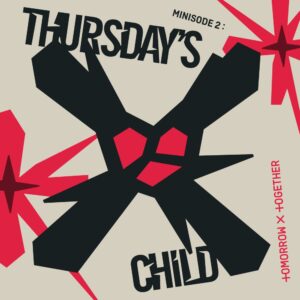
In their very first “minisode” album, TXT described the EP as a pitstop of sorts, an in-between state before moving on from one chapter to the next. minisode 1 bridged the gap between the youthful Dream Chapter and the angsty Chaos Chapter, and minisode 2: Thursday’s Child is expected to do the same with the succeeding, yet-to-be-announced era.
The Dream Chapter was famously filled with lore; it saw the boys of TXT occupy a kaleidoscope of eras—Star, Magic, and Eternity, to be exact—and with each, they dove into the depths of youth and all its highs and lows. minisode 1 capped their metamorphosis with the very bubbly “Blue Hour,” which had its own character and flair. Even if it was just a bridge, a non-chapter, it was memorable in its own right.
The Chaos Chapter, on the other hand, consists of only two eras that are indistinguishable from one another. Sure, Freeze comes as their first full-length album, but Fight or Escape was a mere repackaging of that, adding only a few new songs to it.

TXT leaned hard on their emo-rock personas in the Chaos Chapter. The albums that it produced meld into each other like smudges of leftover eyeliner, and the same can be said of minisode 2, which is less a send-off of an era and more an extension of it.
Conceptually and musically, minisode 2 stays firmly in the Chaos world. Here, they are still angsty, heartbroken boys, only slightly more disillusioned and bitter, if you can believe it. They still dabble in rock (arguably the genre they fit into the most) but lean more on R&B and hip-hop in an attempt to capture their desire to move on from their anger.
There are only two notable things about minisode 2: it expands the Chaos chapter in surprising (sometimes beautiful) ways and it features, for the first time, subunit songs from the group. Everything else about it is frankly forgettable; some songs stand out more than others and hip-hop continues to be a chink in their armor.
Next to pop-rock, ballads come as TXT’s strong suit. The group may lack the attitude for hip-hop and the raspiness for true grunge, but their soft, vulnerable tones and soothing harmonies can and will always elevate a ballad to something quite special. This explains the unexpected virality of “Anti-Romantic” and the cult-like status of “Nap of the Star.” It also explains why “Trust Fund Baby,” despite its funny name, is one of minisode 2’s best tracks.
They continue their victimized, loser narrative in this song, and it can get too whiny at times, but it is undeniably relatable for those of us with so little in life that even love feels like a transaction now. In this day and age, in this brutal capitalist society, one of the painful truths we eventually learn is that of systemic economic inequality. Classism seeps so much into our everyday lives, it can’t even escape a K-pop song.
“Trust Fund Baby” picks up where “Loser=Lover” leaves off. “Loser=Lover” may sing about the adrenaline thrill of escaping your lot in life and stealing “hunnid bands” or whatever you think is rightfully yours, but “Trust Fund Baby” soberly acknowledges the futility of it all. Here, they sing:
Stolen hunnid bands
It makes me miserable, I can’t be the owner.
And before that:
An empty wallet with the namе of a heart
That is even more empty than that
Lover with no dollar sign

“Trust Fund Baby” interestingly (and finally) gives some context to the rage they’ve shown throughout the Chaos chapter. They’ve consistently declared they were “broken,” and not just heartbroken, mind you, but broken in their ideals, dreams, and trust in the world. But where is this angst all coming from?
The dollar sign in “Loser=Lover,” more than just some gimmick, actually speaks to their dire financial situation, their attempts to reconcile societal standing with genuine love. Money is the root of their anger, and “Trust Fund Baby” drives that point all the way home.
Yeah, I know, I know I’m not like them
It doesn’t work even if you add and multiply
For me, who’s a zero in any capital
I’m nothing, I can’t buy it.
If “Trust Fund Baby” follows “Loser=Lover” and, to some extent, “0X1=LOVESONG,” then “Opening Sequence,” minisode 2’s opener, is the spiritual sequel to “Anti-Romantic,” the runaway B-side hit that describes the boys’ romantic reluctance in one of the few ways teenagers know how to—through movie terms.
TXT make multiple references to rom-coms in “Anti-Romantic,” but in “Opening Sequence” they squash all hope of a happy ending in the very first verse:
A breakup pass through the other side of the monitor
The movie begins in the scene where you and I ended
The build-up of a farewell walking along with you
Opening sequence that rewinds back the incident (Ah, ah, ah)
This familiar pain

“Opening Sequence” also tricks the listener into thinking that this is yet another ballad before diving into anger-filled, R&B-backed verses that beg the lover to come back and acknowledge their pain.
The final chorus is even much angrier, accompanied only by electric riffs that reverberate their pain. They sing with finality:
There’s nothing I can do
Blame on me, blame on me, blame on me
You and my tragedy, tragedy, tragedy
It’s full of sadness, sadness, sadness
This scene that locked me up
The sequence that’s like forever
The anger is carried over and amplified in the next track, “Good Boy Gone Bad.” The track is a complete welcoming of heartbreak; it sings of the inevitable fall of someone who had too-high hopes for love. They failed in being an “anti-romantic” and now they’re facing the devastation head-on, with no one but themselves to blame.
There is a betrayal laced into “Good Boy Gone Bad” and the rest of the album that becomes poignant once you realize how hopeful their last comeback, “Loser=Lover,” is. For all of the latter’s sad boy musings, it at least had the boys share their sadness with someone. They sang of a savior of a girl who makes their miserable lives a little bit worth living.

They run away together and transform misery into adventure; in the MV, they reference The End of the F***ing World and Thelma and Louise–road trip stories that have an us-against-the-world throughline between them.
In “Good Boy Gone Bad,” however, the boys spit in the face of this false hope. Presumably left alone, they realize how toxic it actually is to put your complete trust in someone. The impossibility of “saving” a person is a lesson finally learned.
The last two tracks of minisode 2 are subunit songs. “Lonely Boy” pairs Yeonjun and Hueningkai together, while “Thursday’s Child Has Far to Go” is a team-up between Taehyun, Soobin, and Beomgyu.
“Lonely Boy” is pretty straightforward and continues TXT’s sad-boy narrative. Yeonjun shines in this track; as the group’s unofficial main rapper, he commands the contemporary R&B song with incredible finesse. Hueningkai, unfortunately, is terribly underused here. Despite showing his production and vocal prowess in last album’s “Dear Sputnik,” he is relegated here to the wrong genre, given the same lines and notes to sing so that he seems more like a backup to Yeonjun’s lead.
“Thursday’s Child Has Far to Go,” co-produced by Beomgyu, is the attention stealer of the album, not just because it has the honor of bearing the title, but because of the sheer optimism of both its sound and words.
Much of minisode 2—and in the fact, the entire chapter it closes—is doleful and weepy. But in “Thursday’s Child Has Far to Go,” they go back to their upbeat roots, from the retro synths (which sound a bit too much like The Weeknd’s “Blinding Lights”) to the message of hope. The expectation is for TXT to proclaim themselves as Wednesday’s child, who is full of woe, not Thursday’s child who has far to go. It is a bit jarring, then, for them to suddenly jump on this train of positivity.

But it also makes sense given that this is a minisode EP; it should clue us in on the upcoming chapter, and it does just that with this closer. So it’s not presumptuous to think that the next era will be more hopeful, perhaps even kinder and brighter, more reflective and mature. Perhaps they will expound on the lessons learned in this era, such as that of letting go and carefully measuring trust. Perhaps, too, they will acknowledge the impossibility and toxicity of relying on one person to be saved, especially if that person is someone you love.
For now, though, they are reveling in heartbreak, all shouts and emotional self-lashing; a fitting goodbye to the Chaos chapter.
(YouTube [1][2]. AllKpop. Mama Lisa’s World. Lyrics via Genius. Images via HYBE.)


